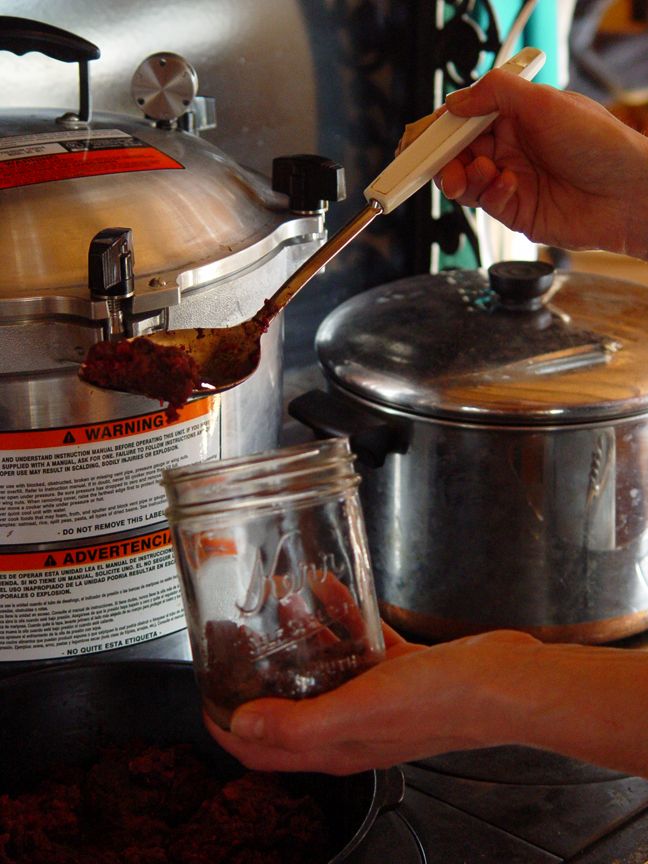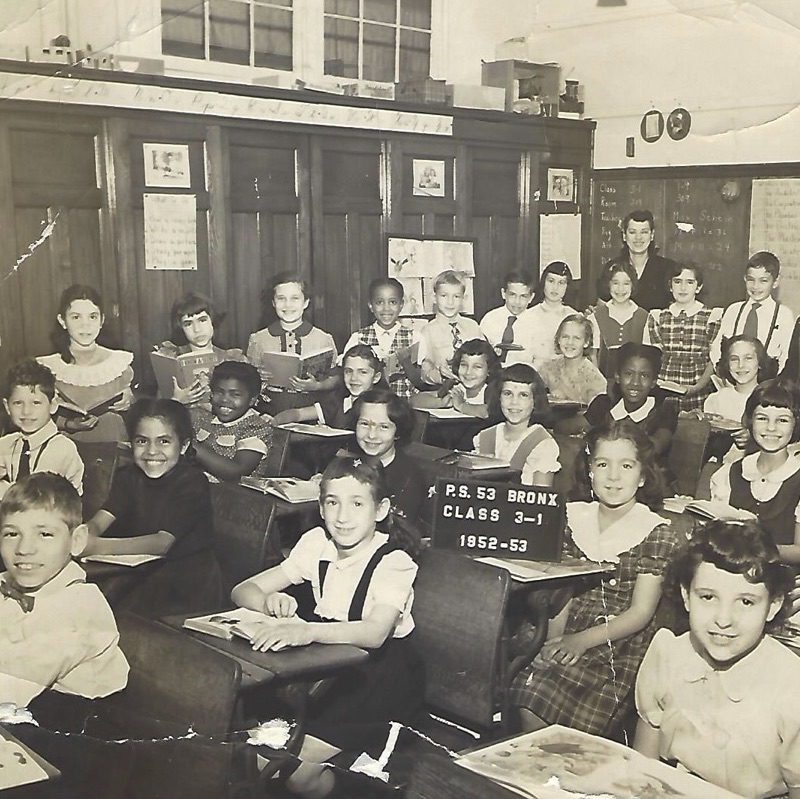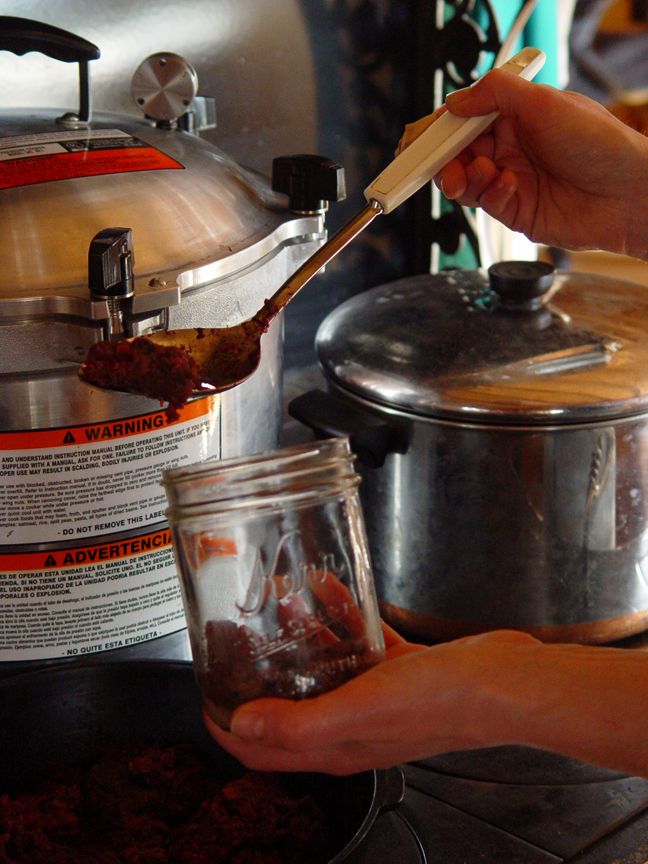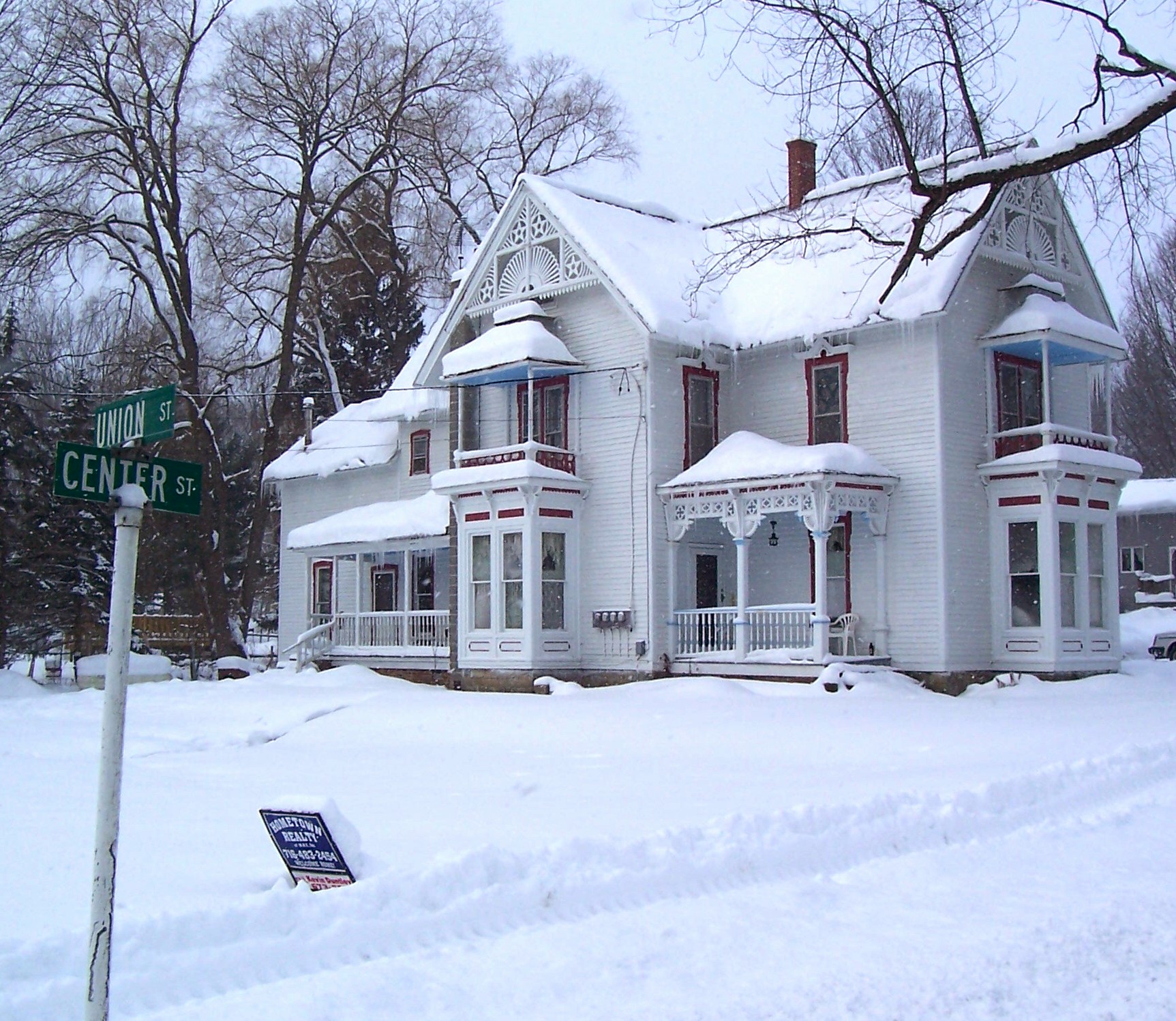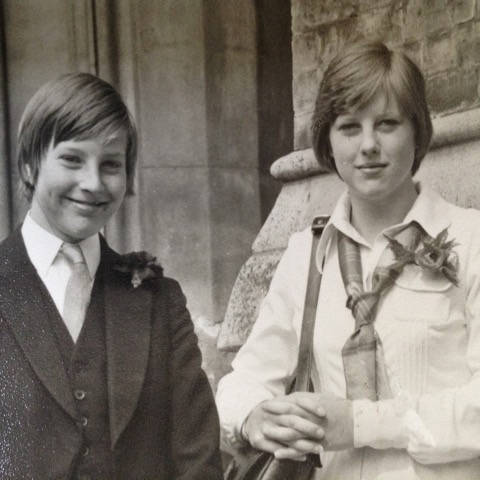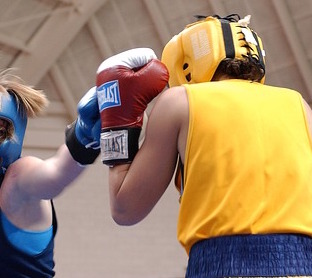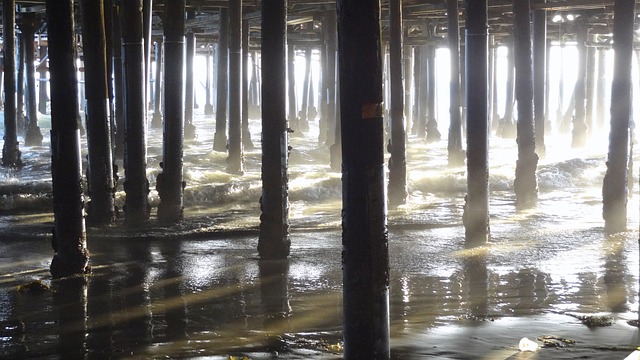It was lonely and a little unsettling, the low putter of the Super Cub droning out of earshot, the airplane's faded yellow fabric grow increasingly indistinct as it headed toward Lake Clark Pass. But the morning was sunny and calm, a balmy thirty-five degrees in our Alaskan late September, and my husband, Steve, would return in a few days. Jäger, our dog, would provide me company in Steve's absence. I'd managed here before by myself; I could do it again. Plus, I had plenty to keep me busy.
That plenty was a moose Steve had taken one week earlier. We'd shared some with our neighbors and transferred the rest, a shoulder and hindquarter, from the meat house to the bath house. It was well aged now, and we had begun harvesting chunks to cut into stew meat or to grind into burger. Bit by bit, we would pressure-can the meat in glass jars—the only option for long-term storage at our off-the-grid home.
A bath house might sound like an odd place to hang meat, but its situation on the property made this decision perfectly logical for us. Our cabin, located on a hill, is higher than the other buildings, but the meat house, built close to the lake shore for better ventilation, is obscured by the "old cabin." The bath house, by contrast, is visible from the new cabin, and we can easily observe any approaching critters from our front window. We had little concern that a marten or weasel might break in. Our biggest fears were that a substantially larger creature, Ursus arctos, would catch a whiff of prime ungulate flesh and find it too appetizing to ignore.
As often happens, our trepidations were eased somewhat, since the bears were keeping a low profile. Two black bears had wandered through in late August, but we hadn't seen a brown bear since the previous Spring. Although black bears are often more curious and can sometimes be greater troublemakers, the brown bears’ shoulder hump and larger size make them appear more threatening. Despite the lack of bear sightings, we took the precaution of leaving several “swami boards” as deterrents around the bathhouse. The theory was that a poke in the paw with the sharp points of nails driven through plywood would discourage any bears from breaking and entering.
After Steve was gone, I took a shower in the bath house, closing the interior door so the meat wouldn’t be exposed to the warmer temperature of the shower. I soaped and scrubbed, never giving a thought to my vulnerability as I shaved my legs with my dull little razor.
By afternoon, I was ready to begin processing some of the meat Steve and I had ground up the day before. I washed and packed sixteen pint jars, added water and salt, secured the lids with metal rings, and placed the jars in the pressure cooker. I stoked the fire in the cook stove, opened all the windows and relaxed. Once the automatic pressure control started jiggling, I was able to monitor it by ear; only when the pressure increased or dropped too drastically did I have to leave my padded chair, add wood to the fire, or move the cooker to another spot. When the job was done I was delighted to find that all the jars had sealed. Things were going well.
There was a substantial amount of ground meat left over. Most of this I transferred back down to the creek, our summer "refrigerator," where scraps for Jäger were cooling in a Tupperware container. I set aside a portion of burger for dinner, which I fried up into a thick patty topped with cheese, then sandwiched between two ample slices of homemade bread. I was comfortable. Too comfortable. It should have made me wary.
Halfway through my meal the flies started showing up. They were common house flies, corpulent bluebottles, with a dazzling metallic sheen that contrasted with their repulsive attraction to the ripening meat. At first I ignored them, figuring a few had crept in under the door and could easily be exterminated.
I finished eating, washed the dishes, and took up my fly swatter.
“Okay, you S.O.B.’s,” I muttered. “Let’s make this quick and clean.”
Looking around the one-room cabin, I guessed there were twenty or thirty flies gracing my windows, and I figured I would make fast work of them. It didn't take me long, however, to realize that I was losing ground. For every two I killed, another dozen appeared. “Crap!” I wailed, when I spotted another one. Then another, and another. “C’mon, I’ve had a long day. I’m tired!”
Where were they coming from? I couldn’t fathom it. Our house is fairly airtight, except for a few cracks around the porch and interior doors. The windows were still open, but they were well screened. There simply weren’t many openings.
Finally, it dawned on me. The stove stacks, one each for the barrel and cook stove, offered an easy route down for the pesky intruders. Still uncomfortably warm from the high heat required for pressure canning, I had let the fire die out, and the room temperature was slowly approaching a more tolerable seventy-five degrees. Perhaps if I lit two small fires, I could drive any incoming flies back out, while further reducing the pervasive odor of meat that was attracting them.
Meanwhile, the flies were reaching ungodly numbers. To top it off, they buzzed and winged around the room in a kind of musical crescendo, bouncing crazily from wall to window and making my attempts to slaughter them nearly impossible. The few I was able to dispatch left grotesque swatches of cream-colored eggs on my windows. I wondered if flies actually increase their egg production if they sense a hospitable environment for laying them. I’d never seen anything like it.
It was nearly 7 p.m., and I was starting to wonder if I would get any sleep that night. I imagined the frenzied flies landing on my head and face as I lay irritably in bed, trying to decide whether to get up and launch another attack. But there was an answer to my dilemma—a bug net. I’d last seen it upstairs in the old cabin, an area used primarily for storage. Jäger, with her arthritis and weak back end, followed me slowly down the hill.
In the loft, rummaging through mess kits, sleeping bags, and assorted camping gear, I was startled by a deep-throated, drawn-out cry.
Maaw ... What was that?
My first thought was, a moose. I’d heard cows make a similar bawling sound during the rut, the time in late fall when the bulls’ sexual excitement is at its peak. Rushing to the window, I peered toward the creek. At the bath house entrance stood a plump brown bear with two very healthy looking cubs. In the panic of the moment, I didn’t notice details. I saw only that the sow was blonde, and the cubs almost equal to her in size. I drummed my fists on the window frame and screamed, “Go on! Get out of here! Now! Move it! Get on! Mooo ... ve!”
The sow looked up but didn't appear the least concerned. I scrambled down the ladder and grabbed the old .300 Winchester Magnum from the north wall. It had been my brother's gun. Steve kept it loaded for emergencies.
The old cabin was my haven; once outside, I had no intention of venturing far, in case the bears started in my direction. Still, I needed to advance at least fifteen feet to see clearly down the path. I raised the rifle, aimed high into the trees, and fired. The bears looked at me blandly as I racked my brain, trying to recall if the magazine held three cartridges or four.
Whereas earlier I had strained my vocal chords trying to get the bears to high-tail it, now I pleaded in a near whisper. “Go. Please. Go. Just turn around and head back into the woods.”
Gripped with fear, I steadied the rifle. Again I shot, lower this time, but still well above their heads. The last thing I wanted was a wounded bear. They ambled off behind the bathhouse, disappearing from view.
I wasn't exactly breathing a sigh of relief at this point. There was no way of knowing how far they’d gone, and I was less than interested in creeping up to the bathhouse to find out. I dashed back into the old cabin. There I ejected the remaining cartridge, then rummaged feverishly through dozens of boxes of ammunition, trying to match a bullet to the one in my hand. No luck. One would have to do. I reinserted it and stepped outside, Jäger close on my heels.
While I was shooting, Jäger had cowered in a corner of the old cabin; now she was under the illusion that I would protect her as we made our way cautiously up the hill. It wasn’t a long distance, only forty yards or so, but we were completely in the open. One bullet, three bears. I moved like an outnumbered policewoman in a gangster movie.
Back inside my cabin, the flies still buzzed noisily. Glancing at the clock and the approaching dusk, I made some quick calculations then turned on the marine radio.
I sat for a while staring at the little plastic box that was my only means of communication and I chastised myself. “You shouldn’t have let Steve leave. It’s too late to be bugging people. Why don’t you buck up and handle it yourself?”
Even as I said these things, I knew that my decision had been made. This was a situation that required me to lay down my pride. My closest neighbor, Howard Bowman, lived five miles to the east.
I keyed the mike. "Portage Creek One, Brown's Landing."
Howard came back: "Brown's Landing, Portage Creek One."
I relayed my story. Tentatively, apologetically, I asked if he might come over and pick up the meat. I didn't feel comfortable with it still hanging in the bath house, I explained. I was afraid the bears would return. The Bowmans, after years of battling bears trying to get at their hanging moose meat, had outsmarted them by building a meat house on top of an outbuilding, well out of reach of tooth and claw.
There was a long pause. Howard, understandably, wasn't too thrilled about transporting a third of a moose down a footpath in the near dark. Though he finally agreed, another fifteen or twenty minutes elapsed by the time he got his gear together, put his skiff in the water, started his outboard, and headed over.
We worked quickly, hauling the meat via wheelbarrow. Pieces of Tupperware scattered around the creek were the only signs that the bears had been there. The ground burger was entirely consumed. As I replaced the swami boards in front of the bath house, it occurred to me why the sow had bawled so loudly—those points mustn't have felt too pleasant on her paws.
Needless, to say, I got very little sleep that night.
Just after midnight, I finished my battle with the flies. I thought about that morning and shuddered to think what would have happened if the bears had appeared while I was showering. I would have had no escape route. Naked and terrified, I would have stood quaking behind the shower curtain while the three bruins crashed through the door and zeroed in on the hanging meat. Worse yet, they could have come after me.
A phrase kept repeating in my mind. It was something an officer had told me when I took the practical part of my driver's test when I was sixteen. "You did fine," he said. "Just don't get too overconfident."
I wasn't. I knew that I would never put myself in this kind of situation again. Guarding fresh moose meat during bear season was not a job I should be doing alone. It’s one thing to be independent; it’s another to be foolish. Only now, in my early forties, did I fully appreciate the fine line between self-sufficiency and unnecessary risk. But a slow learner is still a learner. For hours I lay in bed, rifle close at hand, listening intently for the deft strike of a heavy paw on wood, the shattering of glass.
Anne Coray is the author of three full-length poetry collections; coeditor of Crosscurrents North: Alaskans on the Environment; and coauthor of Lake Clark National Park and Preserve. A lifelong Alaskan, she is the recipient of fellowships from the Alaska State Council on the Arts and the Rasmuson Foundation. Find her at: annecorayalaska.com
